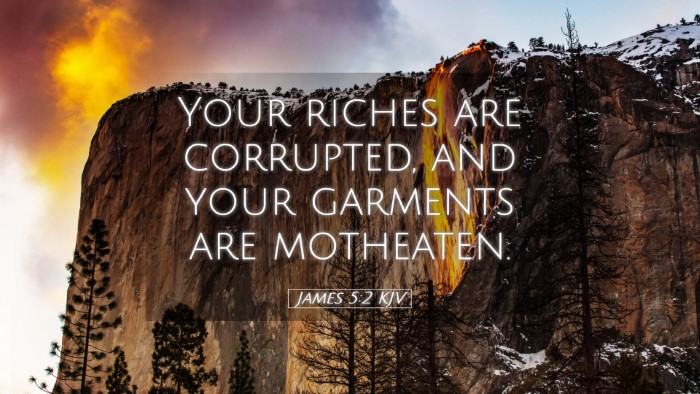Old Testament
Genesis Exodus Leviticus Numbers Deuteronomy Joshua Judges Ruth 1 Samuel 2 Samuel 1 Kings 2 Kings 1 Chronicles 2 Chronicles Ezra Nehemiah Esther Job Psalms Proverbs Ecclesiastes Song of Solomon Isaiah Jeremiah Lamentations Ezekiel Daniel Hosea Joel Amos Obadiah Jonah Micah Nahum Habakkuk Zephaniah Haggai Zechariah MalachiJames 5:2
James 5:2 KJV
Your riches are corrupted, and your garments are motheaten.
James 5:2 Bible Commentary
Commentary on James 5:2
Verse Text: "Your riches have rotted, and your garments are moth-eaten."
Introduction
The epistle of James, often perceived as a letter addressing practical Christian living, emphasizes the ethical dimension of faith. In James 5:2, a striking condemnation of materialism and wealth accumulation is presented. This verse serves as a poignant reminder of the temporal nature of material goods, challenging believers to reflect on their stewardship of resources in light of eternal values.
Contextual Framework
The context of this verse is crucial for understanding its implications. James writes to a community likely facing trials and temptations, many of whom may have been wealthy landowners responsible for the oppression of their workers. James’s critique of the rich serves to underscore not merely a radical socioeconomic analysis but also a moral exhortation to live with integrity and accountability.
Exegesis of the Verse
1. The Condition of Riches
The phrase "Your riches have rotted" suggests a profound decay. Albert Barnes comments on this imagery, noting that riches are ephemeral and ultimately perish. Wealth that is stored up without ethical considerations leads to spiritual decay. This decay is multi-faceted, impacting not only the material possessions but also the soul of the person clinging to these riches.
2. The Garments and Their Significance
The reference to garments as "moth-eaten" resonates deeply within the ancient cultural context. Adam Clarke elaborates that garments were a symbol of status; therefore, their deterioration serves as a metaphor for the futility of seeking status through material possessions. Clothing, designed to signify wealth, becomes a testament to decay when not grounded in righteousness.
Theological Implications
This verse raises pivotal theological questions regarding wealth, stewardship, and the Kingdom of God. Matthew Henry provides insight into how this admonishment serves as a call to humility and a reminder that earthly riches cannot secure eternal standing before God. The transient nature of wealth invites believers to invest in eternal treasures rather than temporal comforts.
1. Wealth in Relation to Faith
The pursuit of wealth often leads individuals away from dependence on God. James's warning serves as a corrective to this tendency. The focus on accumulating wealth can produce a false sense of security, diverting attention from true faith and reliance on divine provision. It challenges readers to consider where their trust lies.
2. Stewardship Principles
Believers are called to be stewards of the resources entrusted to them. This stewardship begins with recognizing that all possessions are gifts from God, meant to be used for His glory and the good of others. Clarke emphasizes the importance of using wealth to support fellow believers and further spread the Gospel rather than hoarding for personal gain.
Warnings Against Materialism
James's words can be seen as prophetic warnings against the allure of materialism. Matthew Henry suggests that the accumulation of riches without regard to ethical implications provokes divine scrutiny. Believers must remain vigilant against the seductive nature of wealth, which can easily lead to spiritual complacency.
Application to Modern Christian Living
For contemporary readers, James 5:2 is a necessary reminder of the implications of material wealth. In a society that often equates success with financial stability, this verse challenges believers to reconsider their priorities and motivations:
- Reflection on Priorities: Believers are encouraged to regularly evaluate what they treasure most in life.
- Engagement with the Poor: The Church is called to mobilize resources for the marginalized, as this reflects the heart of Christ.
- Investment in Eternity: Instead of accumulating wealth, Christians should invest in Kingdom activities that bear eternal fruit.
Conclusion
James 5:2 admonishes believers against the perils of accumulating riches at the expense of spiritual vitality. Both Barnes and Clarke highlight the insignificance and transitory nature of earthly treasures. As we heed this call from Scripture, may our hearts align with God’s priorities, leading to a life characterized by generosity, humility, and a steadfast focus on His Kingdom.


